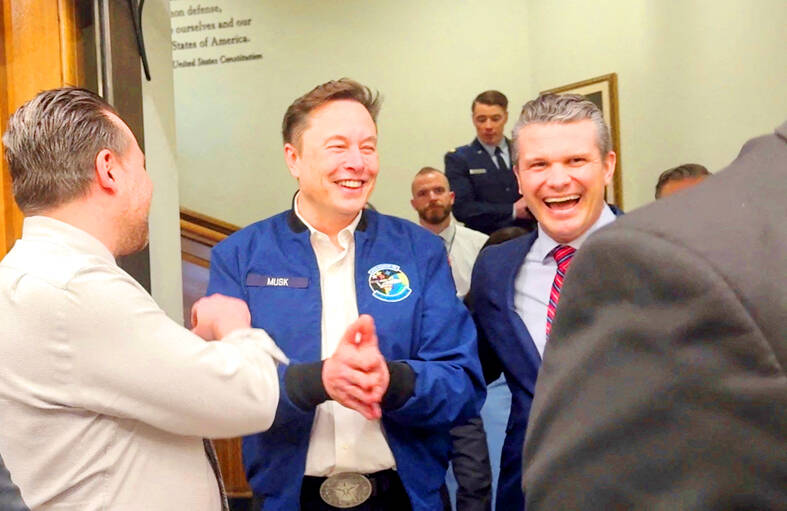Billionaire Elon Musk on Friday took his campaign to cut the US federal government into uncharted waters, holding an unprecedented top-level meeting at the Pentagon and calling for the prosecution of any US Department of Defense officials leaking “maliciously false information” about his visit.
Musk, whose businesses have a number of defense department contracts, met US Secretary of Defense Pete Hegseth for 80 minutes in his first such talks at the Pentagon, which is responsible for a large chunk of federal government spending. It was unclear whether US generals joined that meeting virtually.
The New York Times (NYT) reported that Musk would be briefed on secret war plans for China, something Musk, US President Donald Trump and others denied.

Photo: Reuters
Musk called the report “pure propaganda” and urged legal action against leakers.
“I look forward to the prosecutions of those at the Pentagon who are leaking maliciously false information to NYT. They will be found,” he wrote on X before the Hegseth meeting.
A New York Times spokesperson said leak investigations are “meant to chill communications between journalists and their sources and undermine the ability of a free press to bring out vital information that may otherwise be hidden.”
In a memo released late on Friday, Hegseth’s chief of staff called for an investigation into “unauthorized disclosures of national security information,” to include the potential use of a polygraph tests.
At the White House after the meeting, Trump said he did not want to show the US’ plans for a potential war with China to anybody and hinted at Musk’s potential conflict of interest.
“I don’t want to show that to anybody, but certainly you wouldn’t show it to a businessman, who is helping us so much,” Trump said.
“Elon has businesses in China, and he would be susceptible, perhaps, to that,” he said.
Standing next to Trump, Hegseth said he had an informal conversation with Musk that focused on innovation and efficiencies.
“There was no war plans, no Chinese war plans. There was no secret plans,” Hegseth said.
Following controversy over the New York Times story, a planned meeting between Musk and members of the US Joint Chiefs of Staff in a secure meeting room in the Pentagon, known as “The Tank,” ultimately did not take place.
Access to a closely guarded military plan would mark a sharp expansion of Musk’s role as the Trump adviser who is spearheading efforts to cut US government spending.
It would also fuel questions about conflicts of interest for Musk, who as the head of Tesla Inc and Space Exploration Technologies Corp also has business interests in China.
“There is no legitimate national security or other rationale for providing this information to Mr Musk,” US Democratic senators Elizabeth Warren and Tammy Duckworth wrote in a letter to Hegseth, demanding details on what information was shared with Musk and why.

PREPAREDNESS: Given the difficulty of importing ammunition during wartime, the Ministry of National Defense said it would prioritize ‘coproduction’ partnerships A newly formed unit of the Marine Corps tasked with land-based security operations has recently replaced its aging, domestically produced rifles with more advanced, US-made M4A1 rifles, a source said yesterday. The unnamed source familiar with the matter said the First Security Battalion of the Marine Corps’ Air Defense and Base Guard Group has replaced its older T65K2 rifles, which have been in service since the late 1980s, with the newly received M4A1s. The source did not say exactly when the upgrade took place or how many M4A1s were issued to the battalion. The confirmation came after Chinese-language media reported

A Ministry of Foreign Affairs official yesterday said that a delegation that visited China for an APEC meeting did not receive any kind of treatment that downgraded Taiwan’s sovereignty. Department of International Organizations Director-General Jonathan Sun (孫儉元) said that he and a group of ministry officials visited Shenzhen, China, to attend the APEC Informal Senior Officials’ Meeting last month. The trip went “smoothly and safely” for all Taiwanese delegates, as the Chinese side arranged the trip in accordance with long-standing practices, Sun said at the ministry’s weekly briefing. The Taiwanese group did not encounter any political suppression, he said. Sun made the remarks when

The Taiwanese passport ranked 33rd in a global listing of passports by convenience this month, rising three places from last month’s ranking, but matching its position in January last year. The Henley Passport Index, an international ranking of passports by the number of designations its holder can travel to without a visa, showed that the Taiwan passport enables holders to travel to 139 countries and territories without a visa. Singapore’s passport was ranked the most powerful with visa-free access to 192 destinations out of 227, according to the index published on Tuesday by UK-based migration investment consultancy firm Henley and Partners. Japan’s and

BROAD AGREEMENT: The two are nearing a trade deal to reduce Taiwan’s tariff to 15% and a commitment for TSMC to build five more fabs, a ‘New York Times’ report said Taiwan and the US have reached a broad consensus on a trade deal, the Executive Yuan’s Office of Trade Negotiations said yesterday, after a report said that Washington is set to reduce Taiwan’s tariff rate to 15 percent. The New York Times on Monday reported that the two nations are nearing a trade deal to reduce Taiwan’s tariff rate to 15 percent and commit Taiwan Semiconductor Manufacturing Co (TSMC, 台積電) to building at least five more facilities in the US. “The agreement, which has been under negotiation for months, is being legally scrubbed and could be announced this month,” the paper said,